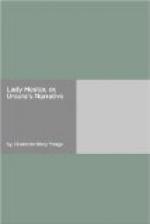This Mrs. Deerhurst had concealed from poor Mr. Dayman; nor would Emily’s modesty allow her to utter the objection to the man’s own face. So Mrs. Deerhurst encouraged him, and trusted to London reports of the grazier’s daughter, and persevering appeals to that filial sense of duty which had been strained so much too far.
And now, how did it stand?
When I, secure in knowing that Alured was safe at home, thinking it abominable nonsense in Miss Deerhurst to have bothered about scarlet fever, Hester herself had said so. When I could hear Fulk’s happiness, and try to analyse it, what did it amount to?
Why, that they knew they loved one another still, and never meant to cease. And with what hopes? Alas! the hopes were all for some time or other. Emily would do nothing in flat disobedience, and there was little or no hope of her mother’s consent to her marrying Farmer Torwood. She meant to tell her mother thus much, that she had seen him, and that they loved each other as much as ever; and as Mrs. Deerhurst had waived the objection to Dayman, it could not hold in the other case. It would be, in fact, a tacit compact—scarcely an engagement—with what amount of meeting or correspondence must be left for duty and principle to decide, but the love that had existed without aliment for six years might trust now. And “hap what hap,” there never was a happier man than my Fulk that evening.
He was too joyous not to be universally charitable. Nay, he called it a blessed fancy of Emily’s that brought her here, as it was Emily’s, and had brought him such bliss he could not quite scorn it, but he did not, could not believe in it as we did. It was culpable carelessness in Hester, but colonial people had been used to such health that they did not care about infection. But it was a glorious act of Emily’s! In fact the manly mind could believe nothing so horrible of any woman.
CHAPTER VII. HUNTING.
Emily told Mr. Dayman the whole truth. Poor fellow! he could not face Fulk again, and went back to Canada.
No doubt Emily went through a great deal, but we never exactly knew what.
Fulk wrote to Mrs. Deerhurst, stating that he hoped in four years’ time to be able to purchase the farm, of which he had the lease, and without going into the past, asking her sanction to the engagement.
She sent a cold letter in answer, to desire that the impertinence should not be repeated.
And Emily wrote that her mother would not hear of the engagement, and she knew Fulk would not wish her to deceive or disobey, “And so we must trust one another still; but how sweet to do that!”
And when any of us met her there were precious little words and looks, and Fulk meant to try again after the four years. In the meantime he was much respected, and had made himself a place of his own. It chafed Hester to perceive that though she had pulled us down she could not depress us after the first. She had lowered her position, too, by her marriage. At first Perrault was on his good behaviour, and made a favourable impression among the second-rate Shinglebay society Hester got round her; but as the hopes of the title coming to her diminished, he kept less within bounds, did not treat her well at home, and took to racing and gambling.




